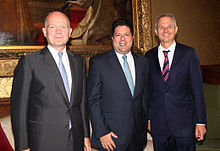Culture of Gibraltar
There is a long established Sephardic Jewish community, a number of Hindu Indians and a Moroccan Muslim population.
During the Second World War, the whole civilian population of The Rock was evacuated by the British government, which decreed that "the fortress comes first".
They were moved to the United Kingdom, particularly to Fulham and Kensington in London and Ballymena in Northern Ireland, as well as Jamaica and Madeira.
This served to strengthen a Gibraltarian, as opposed to simply British, identity, and after the war, there was a successful campaign for repatriation.
Additionally there are two very active congregations of Jehovah's Witnesses sharing the same Kingdom Hall; one has meetings in English and the other in Spanish.
Historically, cultural ties with Spain have been strong; a variant of Andalusian Spanish, "Llanito", being the vernacular language of the territory.
Intermarriage between Gibraltarians and Spaniards resulted in many people having relatives on the other side of the frontier, known in Spanish as La Verja or 'the fence'.
These people were badly affected by the closure of the frontier in 1969, which even saw telephone links severed, so that the only way that families could communicate was to shout across the border gates.
Since the frontier with Spain was reopened, ties with the hinterland, known as the "Campo de Gibraltar", have increased, with many buying property in places like La Línea de la Concepción, where prices are considerably lower, Sotogrande and even further afield like the Costa del Sol.
In addition, Gibraltarians of all ages are often avid supporters of Spanish football teams like FC Barcelona and Real Madrid C.F.
While some in Britain's Foreign Office would like to see this closening of ties result in an 'osmosis' between The Rock and the "Campo de Gibraltar", there is no prospect of Gibraltarians accepting absorption into Spain.
After the Second World War, most evacuees were repatriated, but some stayed on, while many also moved to the UK, thereby increasing family ties with the "mother country".
Surnames in Gibraltar include those originating from: E.g. Alecio, Bossano, Bottaro, Canessa, Cavilla, Culatto, Danino, Devincenzi, Felice, Ferrary, Ferro, Galliano, Imossi, Isola, Lavarello, Licudi, Massetti, Montegriffo, Olivero, Parody, Passano, Pitaluga, Pitto, Pizzarello, Povedano, Ramo, Risso, Sciacaluga, Stagnetto E.g. Aswani, Budhrani, Karnani, Kumar, Mahtani E.g. Agius, Attard, Azzopardi, Borg, Buhagiar, Buttigieg, Calleja, Canepa, Camilleri, Caruana, Debono, Farrugia, Mifsud, Robba, Sant, Spiteri, Teuma, Xerri, Zammit E.g. Britto, Coelho, Correia, Gonçalves, Mascarenhas, Netto, Oliveira, Tavares E.g. Abudarham, Attias, Belilo, Benady, Benamor, Benyunes, Cohen, Federico, Gabay, Hassan, Levy, Serfaty, Serruya, Wahnon E.g. Borrell, Garcia, Gomez, Gonzalez, Lopez, Linares, Mañasco, Martinez, Ocaña, Ramirez, Reyes, Rodriguez, Sanchez, Santos, Vallejo, Vinent, Perez, Hernandez, Moreno, Sevilla, Diaz, Romero, Navarro, Torres, Fernandez, Vasquez E.g. Corby, Crisp, Feetham, Finlayson, Francis, Hook, Holmes, Jones, Randall, Richardson, Tewkesbury, Neish, McKnight E.g. FitzGerald, Byrne, McCarthy While many outsiders use the terms 'Gibraltarians', 'people of Gibraltar' and 'residents of Gibraltar' interchangeably, strictly speaking, 'Gibraltarian' should be used only to describe those British citizens registered as having Gibraltarian status.
In 1981 Gibraltarians successfully campaigned against this classification under the British Nationality Act, which would have deprived them of the right of abode in the UK, along with other colonial subjects.
With the decline of the military presence, and the introduction of self-government, most from the UK instead come to work in the offshore finance sector.
Many affluent people from the UK and elsewhere are classed as "High Net Worth Individuals", who receive tax concessions in return for buying property and residing locally for at least part of the year.
Following the closure of the frontier, Gibraltar could no longer rely on Spanish workers commuting from the Campo, resulting in a labour shortage.
Although they paid income tax and social insurance, they were denied the right to either permanent residence or citizenship, only having renewable work permits.
This policy has prompted criticism from human rights groups in the UK, who describe living and working conditions for Moroccans in Gibraltar as degrading.
There are, at the moment, eighteen Gibraltar Sports Associations that have gained official recognition from their respective International Governing Bodies.

